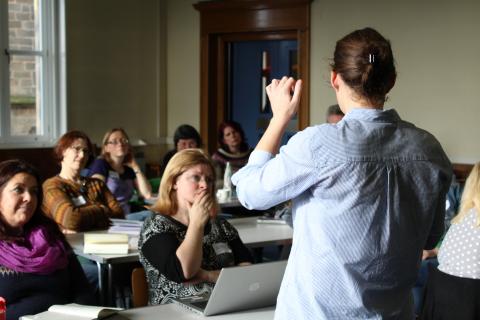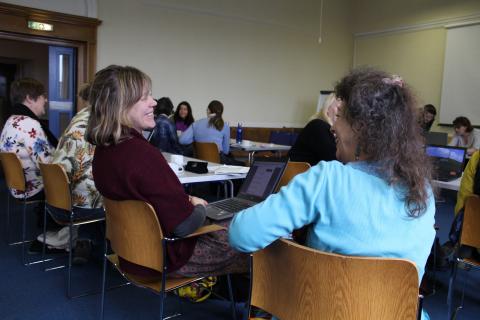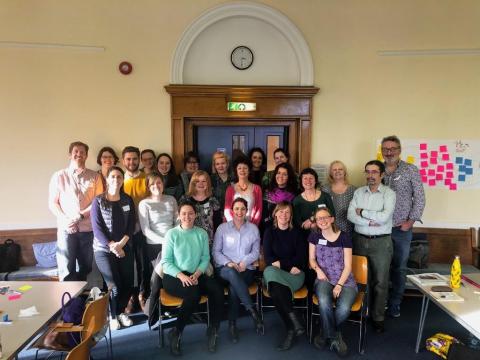
GCED Basic Search Form
Quick Search
You are here
News
On 24th and 25th February, Bridge 47 hosted a training workshop in Edinburgh, Scotland. Led by Dr Karen Pashby (Manchester Metropolitan University), the focus was on Critical Global Citizenship Education within the context of the climate emergency. Participants came together to discuss how to harness critical learnings for their work on climate action in the run up to COP26 this November. With a view of the snow-capped hills of Edinburgh, we spent a wonderful two days tackling complexities and engaging with critical methods. Here is some food for thought inspired by our discussions, from Communications Trainee Kate Lesenger.
An aim of GCE
At the beginning of our training workshop, Karen Pashby showed us this image of a world map. It got us thinking about how we see and understand the world within the parameters of our own experiences. What we view as the norm is dependent on our own geographies, communities, and upbringings. How we are educated plays an important role in moulding how we view the world. Yet often, our formal education systems perpetuate a discriminatory narrative, which can lead to preconceived assumptions and problematic approaches to global issues. As key to framing our discussions, Karen highlighted the following aim of GCE from UNESCO: to “support learners to revisit assumptions, world views and power relations in mainstream discourses and consider people/groups that are systematically underrepresented/ marginalized”. But if this is what GCE sets out to achieve, then what does it mean to be ‘critical’ in GCE?
What is critical GCE?
Karen emphasised to us the importance of nuanced reflection, describing that in critical GCE we can provide the space to deeply reflect and engage with complexities, questioning the histories of our own cultures and settings. In this way we can confront our pre-existing assumptions, as well as the unequal power relations that are often not immediately apparent. If we don’t do this, we run the risk of jumping to offer quick fixes to real life problems, sweeping the conflicts and intricacies right back under the rug.
‘In these complex times, we need students to know there are solutions. But just focusing on action may step over an engagement with complexities. We need reflexivity. Critical reflection is not negative, but presents a nuanced approach, instead of a forced positive one.’

A crisis in learning
As Karen said, while letting students know there are solutions to global problems, teachers should not avoid the complexities. In recent research co-led by Karen, it was found that there was a tendency among secondary teachers to focus on uncomplicated, simple solutions to global issues. Karen argued this to be a “crisis in learning” – when teachers offer a kind of comfort and consolation, rather than equipping their students with the critical and ethical tools to respond to complex problems, such as the climate emergency.
Critical GCE & the climate emergency
From this research, Karen and Louise Sund (Örebro University & Mälardalen University) created a teaching resource for secondary teachers. In it they outline some guiding principles for bridging GCE with Education for Sustainable Development. One principle is as follows: “Environmental issues are deeply tied to social, political, cultural and economic inequalities; it is essential to link such issues to historical and present day colonial systems of power.”
Here in the UK, the core broadcasted narrative has a habit of glossing over how the causes and effects of climate change are linked to inequality, discrimination, and Britain’s colonialist past. Thinking about these links sparked discussions in our group surrounding complicity; there is a need for Scotland and other countries in the Global North to grow comfortable with the fact that we are a part of the problem we are trying to solve.
Unlearning through critical GCE
A key takeaway from the workshop was that when translated into practice, being critical in GCE requires what Karen describes as ‘unlearning’. Thinking back to that world map, can we unlearn the way we have been taught to view something? This practice of unlearning must allow for a shared dialogue with marginalised voices, while recognising complexities and our own complicity. Being critical in GCE gives us a flexible space to do this: a space within which we can look at problems more inclusively and lean into the process of unlearning.
Right now, we are facing an unprecedented global crisis in the form of COVID-19. At Bridge 47, we believe that Global Citizenship Education carries the most value as a vehicle for dealing with complexities and uncertainties. Perhaps now more than ever, it could really help to guide us.
Thank you to Karen Pashby for leading our training, and to Carrie Karsgaard (University of Alberta) for her virtual visit and thought-provoking insights on her work with Indigenous youth at COP.
For further reflections on the COVID-19 crisis, read our project manager Nora Forsbacka’s blogpost on ‘Navigating the Storm' here.
Useful resources from our training:
#Decarbonize #Decolonize COP23: A Global Youth White Paper (2017)
Tracking Change project, Canada (2018)
International Youth White Paper on Global Citizenship (2017)
Vanessa Andreotti on her critical tool ‘HEADS UP' (video)
Author: Kate Lesenger, Events and Communications Trainee (kate.lesenger@bridge47.org)
URL:
https://www.bridge47.org/blog/03/2020/unlearning-through-critical-global-citizenship-education


